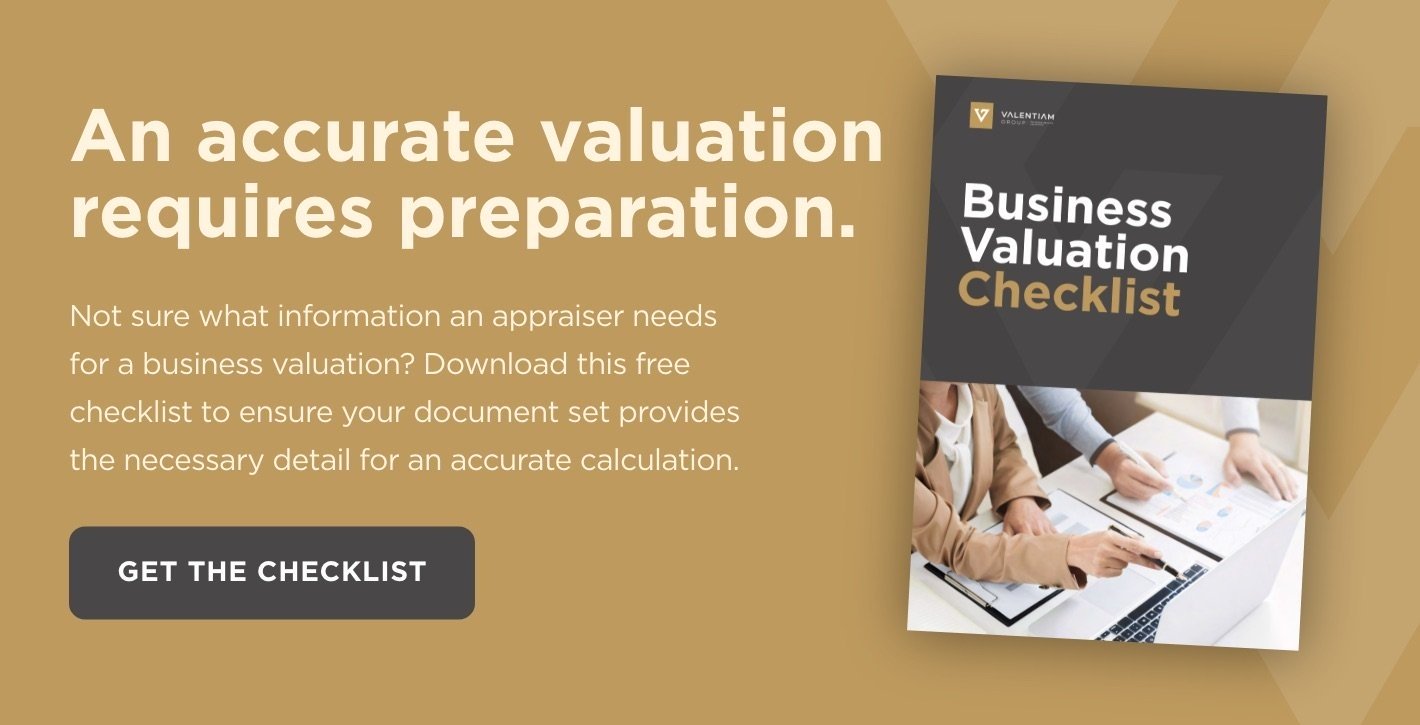5 Rules Of Thumb For Business Valuation
Posted by Valentiam Group on March 10, 2020

There are a number of articles, lists, and blog posts on various websites regarding the rules of thumb for business valuation, covering how to value a business based on revenue, business valuation multipliers, comparables, and other value measures.
Those measures of value are all important and useful, but they aren’t the most fundamental rules for business valuation. Focusing on the measures is less important than understanding the purpose of the valuation and the business itself, both of which will suggest the proper metrics to use in assessing value. In this article, we’ll focus on the five most basic—but essential—rules of thumb for business valuation.
5 Fundamental Rules Of Thumb For Business Valuation
To lay the foundation for fair and accurate valuations in any business, apply these five broad principles:
Rule #1: Understand The Purpose Of The Valuation
There are several reasons why a business might need to be valued, such as:
- Acquisition by another company or buyer
- Sale of a share of the business by a partner or member
- Addition of new LLC members
It’s important to understand the reason for doing the evaluation because it will affect the assumptions you make, the measurements you use to determine value, and ultimately, your opinion of the value of the business.
Once you understand the purpose of the valuation, you can also evaluate the scope of your role in determining the value. If you are trying to determine the value of a company for the purpose of a personal stock investment, for example, you are going to do a very different analysis than if you are preparing a professional appraisal report valuing a business for sale. The requirements for the valuation in each case are very different and will determine the scope of your role in assessing the value.
Rule #2: Go To The Right Sources For Your Rules
Once you understand the reason for the valuation, you’ll know where to look for guidelines:
- Federal tax purposes: Follow the rules in the IRS code.
- Accounting purposes: Follow accounting standards.
- Financial markets: Look at industry standards.
- Mergers and acquisitions: Rely on multiples. (To determine multiples, do an analysis on stock price and trades versus the market, and compare that multiple to revenue and earnings.)
Look for the proper guidance for the specific case by going to the right rule set.
Rule #3: Understand The Business
This point seems obvious, but understanding the business you are valuing goes beyond understanding the business type, sector, and market.
Talk to relevant parties and stakeholders; there may be a lot you don’t know about the company. To properly and fairly value a business, you have to understand it. Speak with the business owner or the client for the valuation, and ask for the right information to get the right data for your value appraisal.
Rule #4: Use The Right Metrics For Valuation
This is where most “rules of thumb” articles about business valuation are focused: on the valuation tools and measures. There are several of them, but depending on the case, one or more will be a better fit than the others. Whether you use a market, cost, or income approach will depend on why you’re doing the evaluation. It’s important to start off the process correctly so you end up using the right approach and don’t go off on a tangent.
When looking at revenue, for example, it’s critical to establish customer churn. How many customers are repeat buyers, and how many are new? Customer churn helps you determine if the business’ revenue is secure. Also keep in mind that revenue in itself will not give you the whole picture; you also have to consider business expenses. If the business has high revenue but also a high spend rate, revenue alone may present an inaccurate picture of value.
A market approach, using multiples to compare against other companies, can help you avoid an over-focus on revenue. (Tweet this!) For example, a valuation of Uber would reveal lots of revenue and growth—but also high operating expenses. Uber is not making money and has never made a profit, so how can it be valued? In this situation, comparing those metrics versus Uber’s market share can help determine if it’s properly valued. Look at Uber’s revenue per share compared to Lyft or other rideshare companies. All have the same profile; none are yet profitable. If you see that Uber is trading at $10 per share while Lyft or other rideshare companies are trading between $10 and $11 per share, you can determine whether Uber is underperforming or overperforming relative to the competition.
It’s also important to use the right comparables. Comparing businesses in different industries will not give an accurate picture; comparing Union Pacific to AT&T will result in a large disconnect, because value in the freight and telecommunications industries may be determined in different ways. Revenue may drive trends in one industry, while profit margins may be most important in another. Valuation multiples for consulting firms, for example, are likely to be very different from those for retail businesses. Also important is the industry life cycle; businesses in growth industries are generally not comparable against those in mature industries. Even with rules of thumb, there are gray areas.
When considering revenue multiples, it’s no less important to find the right measuring stick. If the company being evaluated has stock trading at five times earnings, while others in the industry with similar profiles are trading at 10 times earnings, it’s an indication that the company is undervalued. In these types of cases, you want to look at value from the perspective of an ordinary buyer or independent third party. Multiples from the market, using the right comparisons, can tell you if the company is properly valued.
Rule #5: Get An Expert Opinion
If you’re unsure about the right approach for establishing the value of your business, contact a valuation professional. An expert familiar with the rules for valuation will use the proper metrics to establish a fair, defensible valuation.
The valuation experts at Valentiam have decades of combined experience and ASA/CFA credentials. We work with companies in all industries to provide valuations for both tangible and intangible assets, for purposes of financial reporting, M&A, business planning, purchase price allocation, property tax, and tax appeals. We’ll provide accurate and defensible valuations, as well as expert testimony if necessary. Contact us about your valuation needs and let us know how we can help.
Topics: Business valuation
Related Posts
EBITDA Multiples By Industry: An Analysis
EBITDA multiples by industry indicate growth, profitability, and stability of profits in various sectors—and are a quick and easy way to estimate value.
Valuation Methods: A Guide
Different types of business valuation methods are suited to specific needs. Here are the three primary types of valuation techniques and when they should be used.


